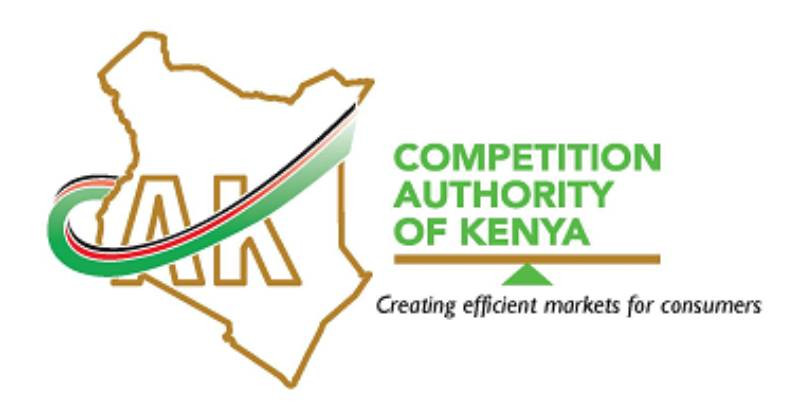 |
|
IMF Managing Director Christine Lagarde (left) and Treasury Cabinet Secretary Henry Rotich when she visited Kenya recently. Rotich said high interest rates are strangling investment in the country. [PHOTO: KIBERA MBUGUA/STANDARD] |
By NICHOLAS WAITATHU
Competition Authority of Kenya (CAK) will before the end of this month hire a consultant to conduct a market inquiry into the banking sector. This will be done in conjunction with the Kenya Financial Sector Deepening programme.
The authority wants to review competition in the banking sector. It aims to tackle increasing interest rates. “Our aims is to interrogate issues contributing to high interest rates in the local market and to ensure consumers are protected from unethical trade practices,” said CAK Director General Wang’ombe Kariuki in an interview in Nairobi last week.
He said the study would be carried out in two phases.
Wang’ombe noted that the findings of the study would be shared with industry stakeholders before the end of the current financial year.
Consumer protection
“There have been concerns in the banking industry over increasing interest rates, which is being blamed on the slow pace of investments in various sectors of the economy thus contributing to an increase in poverty, under-development and loss of business,” said Wang’ombe.
He observed that the initiative is driven by the need to ensure sound consumer protection in the market in addition to preventing escalation of unethical business behaviour, which in the long run strangles competition.
Wang’ombe explained that the first phase of the study would focus on identifying areas that contribute to the problems in the market.
For example, the corporate and retail sectors of banks face different problems.
The second phase will involve finding out the causes and devising solutions to the identified problems.
Consumers attributed the high interest rates to collusion by major banks, leading to a high cost of borrowing in the local market.
Commercial banks insist that the high interest rates they charge are linked to the high cost of lending and high-risk levels in the economy.
High rates have led to more defaults. This is as customers’ purchasing power dwindles.
Increased cost of borrowing has affected various sectors. The property market has suffered a decline in production after developers slowed down their activities due to skyrocketing rates coupled with high cost of materials, affecting their profit margins.
Stay informed. Subscribe to our newsletter
Treasury Cabinet Secretary Henry Rotich, in a recent communication to CAK, welcomed the initiative. He said high interest rates were strangling investment in the economy.
Regulating interest rates lies with market regulator Central Bank of Kenya (CBK). According to the CBK, average lending rates as at the end of November 2013 reached 16.89 percent.
The industry average rate reached 16.89 per cent after the CBK Monetary Policy Committee retained the CBR at 8.50 per cent.
Market inquiries
Wang’ombe noted that the authority is also doing market inquiries in the tea and seed sub-sectors and in the dairy industry – particularly focusing on Artificial Insemination (AI) services.
“In the tea industry, we have been evaluating the entire value chain, with focus on the Mombasa tea auction,” he said. “Our aim is to find out whether regulations governing the auction have been hindering healthy competition, making the industry uncompetitive.”
Other concerns being probed include governing regulations, especially on registration of new tea factories and levies charged to tea farmers. In the dairy industry, the authority is investigating factors contributing to the high cost of AI services to the farmers over natural bleeding.
In the seeds sub-sector, there have been claims of companies selling substandard seeds to farmers – a situation believed to be affecting food security in the country.
 The Standard Group Plc is a
multi-media organization with investments in media platforms spanning newspaper
print operations, television, radio broadcasting, digital and online services. The
Standard Group is recognized as a leading multi-media house in Kenya with a key
influence in matters of national and international interest.
The Standard Group Plc is a
multi-media organization with investments in media platforms spanning newspaper
print operations, television, radio broadcasting, digital and online services. The
Standard Group is recognized as a leading multi-media house in Kenya with a key
influence in matters of national and international interest.
 The Standard Group Plc is a
multi-media organization with investments in media platforms spanning newspaper
print operations, television, radio broadcasting, digital and online services. The
Standard Group is recognized as a leading multi-media house in Kenya with a key
influence in matters of national and international interest.
The Standard Group Plc is a
multi-media organization with investments in media platforms spanning newspaper
print operations, television, radio broadcasting, digital and online services. The
Standard Group is recognized as a leading multi-media house in Kenya with a key
influence in matters of national and international interest.









